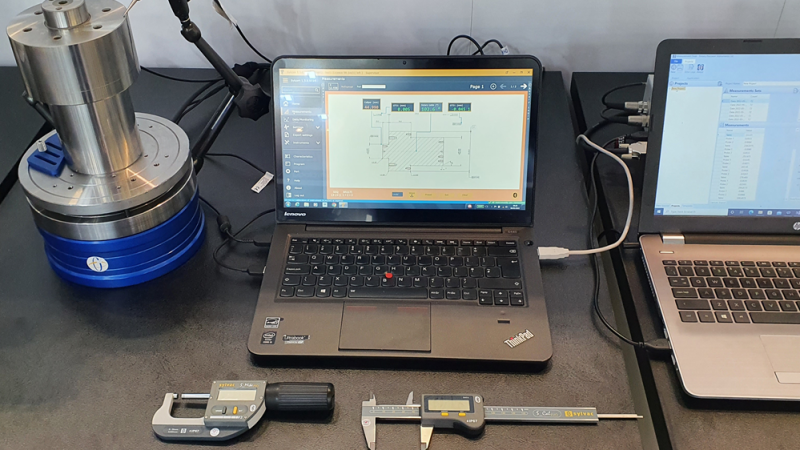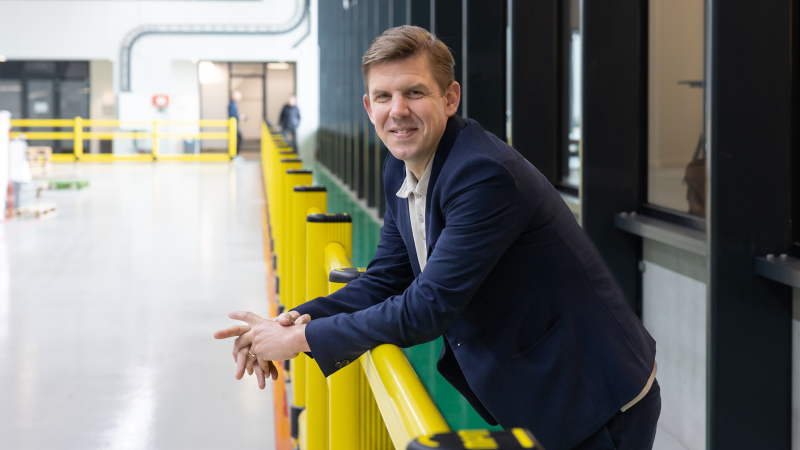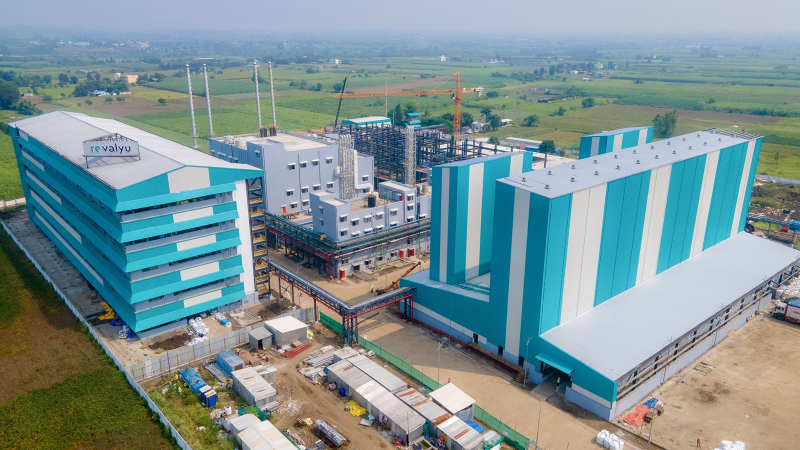We learn how a focused strategy is helping Ametek Land revolutionise its industry sector.
In the town of Dronfield, just outside Sheffield, lies the headquarters of Land Instruments International, now known as Ametek Land. The company has been based here for 75 years.
 “We were born out of the Sheffield steel industry, which was booming then, and is still booming, but now it’s moving in a different direction,” says David Primhak, Director of Sales and Product Management at Land. “We originally manufactured thermocouples but now produce many different types of pyrometers and temperature measurement devices. Over the last 75 years, our specialism has evolved into a non-contact temperature measurement. We measure the energy being emitted by an object to understand its temperature using tools such as thermal imagers & line scanners.”
“We were born out of the Sheffield steel industry, which was booming then, and is still booming, but now it’s moving in a different direction,” says David Primhak, Director of Sales and Product Management at Land. “We originally manufactured thermocouples but now produce many different types of pyrometers and temperature measurement devices. Over the last 75 years, our specialism has evolved into a non-contact temperature measurement. We measure the energy being emitted by an object to understand its temperature using tools such as thermal imagers & line scanners.”
Over the years Ametek Land has also developed a combustion efficiency product line with their products serving steel, hydrocarbon processing, glass manufacturing and power generation, but these are just some of the markets the company operates in. Land is present wherever there are high temperatures or gas to measure, all around the world.
“As well as our headquarters in Dronfield we have service centres in Pittsburgh, Dubai, Bangalore, Shanghai, Osaka and throughout Europe,” Primhak says.
That said, Primhak is clearly proud that Land is a locally based business.
“We are in total about 150 people, with two-thirds of us based in Dronfield,” he says. “We are proud to employ a lot of local people. Everyone in Dronfield knows who Land are, even if they might not know what we do because it’s a niche technology.”
A Unique Culture
As well as being a local business, Land has traditionally been a family business, owned by the Land family. That was until 2006 when the company was bought out by Ametek, an American corporation specialising in differentiated electronic instruments and electromechanical devices.
“Their strategy was an acquisition, but not according to a standard blueprint,” Primhak tells us. “They let us run the business while maintaining our own culture and the ethos, and that has been the key to our success.”
Of course, when undergoing a transition like this it is always a challenge for a company to preserve its culture.
“The first few years are hard work for any company that goes through that acquisition process, and it is a credit to Ametek, but it makes a real difference having a leadership team engaged in running the company themselves rather than asking corporate what they want,” Primhak tells us. “We are very empowered. We go away and develop the strategy and the budgets and instil that strategy into our teams. That kind of ownership allows us to maintain our identity, and we have got a lot of people who have been here for 30 or 40 years.”
An essential part of that culture is communication, which Primhak maintains through a quarterly brief to honestly discuss the company’s progress, its strategy and how it is evolving.
Developing Talent and Technology
It also works hard to attract and develop new talent, particularly through collaboration with research partners.
“We’ve got very close ties with local academia, including Sheffield University, Sheffield Hallam, local schools and colleges where our leading technical minds go and enthuse local kids with our technology,” Primhak says.
Every year Ametek Land takes in eight-to-ten industrial placement students, and sometimes sponsors PhDs in interesting areas of research where the company cannot develop the technology itself. The company is also enthusiastic about promoting talent internally.
“We like bringing people through the organisation rather than trying to pinch talent from outside. I started as a design engineer back in 2005,” Primhak says. “I’ve moved up through the organisation, and we’ve got many other people who came here straight from School or University who have been promoted with Land.”
Ametek Land is also a corporate sponsor of Glass Futures, a not-for-profit that looks at how glass can become sustainable in the future and how to drive down energy usage.
Investing in talent in this way is absolutely essential for Ametek’s work.
“We are a technology measurement company,” Primhak says. “We employ very smart people, with best-in-class capabilities in the physics world. We can make difficult measurements, but we also have a long tradition and history of designing products that operate in heavy industrial environments. It’s all very well creating equipment that can measure accurately, but the question is, can it do that for hours at a time in a glass factory or steel mill?”
Ametek Land can do that so well that sometimes it becomes a victim of its own success.
“We have technology out there that is sometimes 30 years old and is still in operation. Of course, that can be a frustration to our sales team sometimes when they’re trying to sell a new one!” Primhak admits. “We design for survivability.”
To convince customers to buy the next product, Ametek Land needs to offer them something.
“We add value by helping our customers improve energy efficiency. Everyone wants cars to be lighter to reduce fuel and run more effectively with batteries,” Primhak says. “They need thinner, stronger, less energy-intensive steel, which means much tighter temperature controls. So, they’re looking to get an edge, and as our products become more accurate that case becomes more compelling. Everyone wants to increase yield and enhance quality.”
75 Years of Expertise
 Ametek Land is celebrating its 75th anniversary this year, and the company has grown and evolved a lot in that time, always through strong customer relations and a great internal culture. But talking with Primhak, he believes the key lesson the company has learned recently is “Focus”.
Ametek Land is celebrating its 75th anniversary this year, and the company has grown and evolved a lot in that time, always through strong customer relations and a great internal culture. But talking with Primhak, he believes the key lesson the company has learned recently is “Focus”.
“This was brought to life during the Covid pandemic,” he says. “Like every company, we tend to be distracted by the next shiny thing. So, we have learnt to prioritise, focusing on only one, two or three big things to get much better results, rather than trying to do ten things at once.”
The pandemic really showed the results this approach can yield.
“We were being asked by customers to produce a fever screening system. It is basically a thermal imager used to monitor skin temperatures to prevent potential covid cases entering offices or critical infrastructure,” Primhak recalls. “We said drop everything else, this is what we focus on.”
Ametek Land developed an imaging system with facial recognition, taking it from concept to launch in four weeks.
“For a business like us, our timescales of development tend to be measured in months or years, so to do that in four weeks was amazing,” Primhak tells us.
The company is already focussing on new challenges.
“The biggest thing going on from a macro point of view is decarbonisation. We’re moving into a new era and if we don’t move quickly enough the consequences for the world will be dire,” Primhak insists. “But with that transition new industries are emerging. The electric vehicle market is growing at an extraordinary rate, and manufacturers are looking for better materials and how to improve their production techniques. The hydrogen economy will also play a major part in the future and we provide instruments for monitoring the furnaces used to make hydrogen.
There is a whole multi-factor challenge going on in the world and we’re working with partners and industry specialists to see how we can help with that journey.”
Ametek Land is well positioned to help its customers digitalise and make people safer, introducing tools that will allow people to remotely monitor and control processes in dangerous environments where before they would potentially be putting an operator in danger.
“That’s a big part of the future for us with thermal imaging, helping people automate and perform remote operations and monitoring,” Primhak says.







